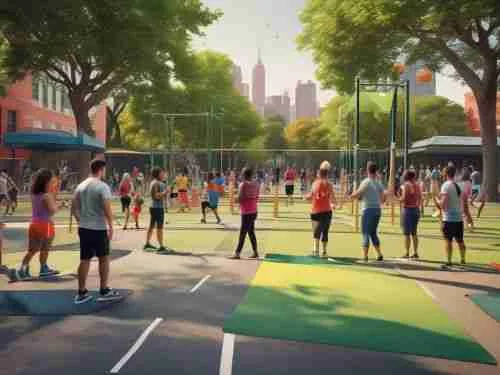Playful Movement for Rehabilitation & Recovery
Helping restore mobility, balance, and coordination through engaging, evidence-based playful movement therapy. Support for Parkinson's disease, motor skill challenges, and physical rehabilitation.
Evidence-Based Rehabilitation Approach
Recent 2024 research emphasizes that rehabilitative interventions play a crucial role in improving health outcomes, with growing evidence demonstrating benefits for motor and non-motor functioning, activities of daily living (ADL), and quality of life.
Our playful movement approach aligns with multidisciplinary rehabilitation guidelines that incorporate occupational therapy, physical therapy, and functional movement training.
Motor Skills Development
Target motor skills, daily activities, and engagement in meaningful tasks through playful, progressive movement challenges that feel like play, not therapy.
Balance & Coordination
Improve balance and reduce fall risk through fun balance beam activities, ball tossing, juggling, and other coordination-building exercises.
Neural Pathway Training
Cued training teaches patients to use external cues to facilitate movement, utilizing frontal cortical and cerebellar mechanisms instead of defective circuits.
Support for Parkinson's Disease
How Playful Movement Helps
Parkinson's disease affects movement, balance, and coordination. Our playful approach helps by:
- Improving motor function: Progressive activities that challenge and rebuild movement patterns
- Enhancing balance: Reduce fall risk through engaging balance exercises
- Building confidence: Success in playful activities boosts confidence for daily tasks
- Cognitive stimulation: Hand-eye coordination games keep the mind sharp
- Social engagement: Fun activities that can be done with family and friends
- Quality of life: Enjoyable movement makes therapy feel less like work

💡 Research Insight
"Rehabilitative interventions demonstrate benefit for motor and non-motor functioning, activities of daily living, and quality of life in Parkinson's disease." — 2024 International Consensus Statement
Key Rehabilitation Benefits
🏃 Improved Mobility
Restore and enhance mobility through progressive movement challenges that adapt to your current abilities and gradually increase in difficulty.
🤲 Fine Motor Skills
Juggling, ball manipulation, and precision activities rebuild fine motor control essential for daily tasks like buttoning shirts, writing, and eating.
👀 Hand-Eye Coordination
Catching, tossing, and tracking activities strengthen the vital connection between visual input and motor response.
💪 Functional Strength
Build practical strength for real-world activities through movements that mimic daily life challenges in a playful context.
😊 Reduced Fear of Falling
Confidence-building balance activities in a safe, controlled environment help overcome fear and anxiety around falling.
🎨 Enjoyable Therapy
When therapy feels like play, adherence increases. Fun activities make rehabilitation something to look forward to, not dread.
Our Progressive Rehabilitation Approach
Start Simple
Begin with basic activities matched to your current ability level. Success builds confidence.
Progressive Challenge
Gradually increase difficulty as you improve. Each small victory prepares you for the next level.
Celebrate Progress
Track improvements in balance, coordination, and daily function. Every gain matters.
💫 The Playful Difference
Traditional therapy can feel like work. Our approach makes rehabilitation engaging and enjoyable:
- Activities feel like games, not exercises
- Clear, achievable goals keep you motivated
- Safe progression builds confidence naturally
- Fun factor increases adherence and consistency
- Can be done at home with simple, inexpensive equipment
Rehabilitation Activity Examples
⚾ Bean Bag Toss
Improves hand-eye coordination, depth perception, and upper body mobility. Progressive targets make it fun and challenging.
Try this activity →🎯 Balance Beam Walk
Builds balance, stability, and confidence. Start with wide, low beams and progress to narrower, higher challenges.
Try this activity →🤹 Simple Juggling
Enhances bilateral coordination, timing, and focus. Start with one ball and gradually add complexity.
Try this activity →Start Your Playful Rehabilitation Journey
Whether recovering from injury, managing a chronic condition, or simply wanting to improve mobility and balance, our playful approach makes rehabilitation effective and enjoyable.